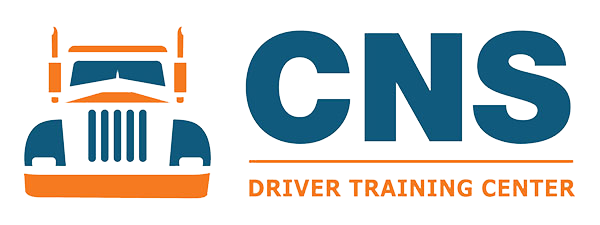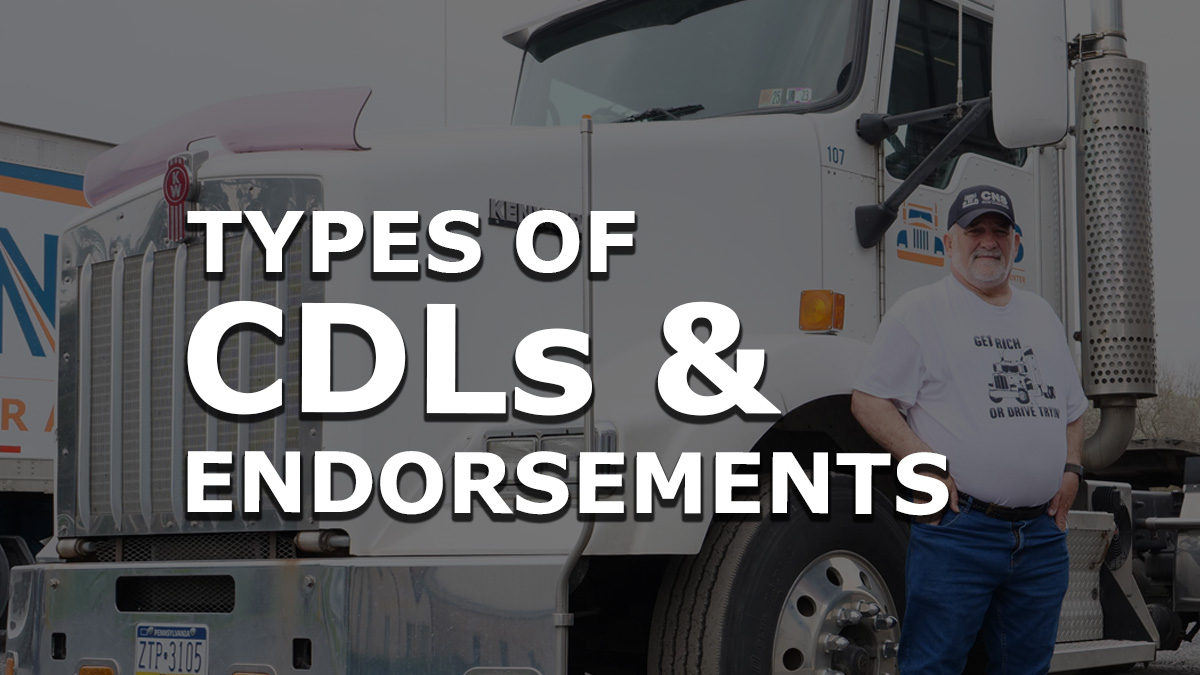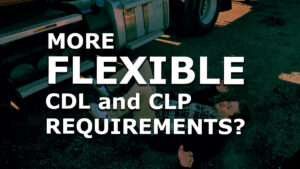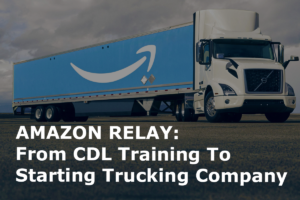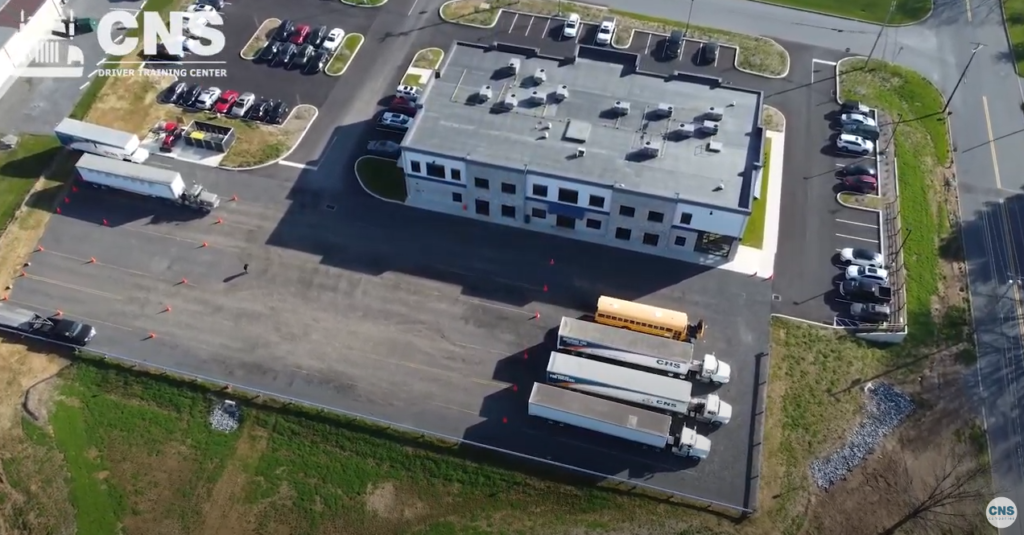Did you know that drivers have been required to have a commercial driver’s license (CDL) in order to drive certain commercial motor vehicles (CMVs) since April 1, 1992?!
The goal, of course, is to: improve driver quality, ensure commercial drivers have the skills needed to operate commercial vehicles, and prevent drivers from having more than one driver’s license.
But are you confused about the different CLD classes, endorsements, or restrictions you can get?
Relax, we break all of this down for you.
Who needs a CDL?
Drivers are required to obtain and hold a CDL if they operate in interstate, intrastate, or foreign commerce and drive a vehicle that meets one or more of the classifications of a CMV described below:
- A combination of vehicles with a gross combination weight rating (GCWR) of 26,001 pounds or more, provided the vehicle being towed is in excess of 10,000 pounds.
- A single vehicle with a gross vehicle weight rating (GVWR) of 26,001 or more pounds.
- A vehicle designed to transport 16 or more persons, including the driver.
- A school bus designed to carry 11 passengers or more, including the driver.
- Any size vehicle, which transports hazardous materials and is required to be placarded in accordance with federal regulations.
- Any size vehicle used in the transportation of any material that requires hazardous materials placards or any quantity of a material listed as a select agent or toxin in 42 CFR 73. Federal regulations through the Department of Homeland Security require a background check and fingerprinting for the Hazardous materials endorsement.
But there are different types of CDLs: Class A, Class B, and Class C. What type do you need?
What CDL Class type do I need?
Federal standards require states to issue CDLs and commercial learner’s permits (CLPs) to drivers according to the following license classifications:
Class A*: Any combination of vehicles which has a gross combination weight rating or gross combination weight of 26,001 pounds or more, whichever is greater; inclusive of a towed unit(s) with a gross vehicle weight rating or gross vehicle weight of more than 10,000 pounds, whichever is greater.
Class B*: Any single vehicle which has a gross vehicle weight rating or gross vehicle weight of 26,001 pounds or more, or any such vehicle towing a vehicle with a gross vehicle weight rating or gross vehicle weight that does not exceed 10,000 pounds.
Class C: Any single vehicle, or combination of vehicles, that does not meet the definition of Class A or Class B, but is either designed to transport 16 or more passengers, including the driver, or is transporting material that has been designated as hazardous under 49 U.S.C. 5103 and is required to be placarded under subpart F of 49 CFR Part 172 or is transporting any quantity of a material listed as a select agent or toxin in 42 CFR Part 73.
Note that (*) means CDL or endorsement requires entry-lever driver training if the driver is seeking to obtain it for the first time. Learn more about ELDT here.
What are CDL Endorsements?
Drivers who operate special types of CMVs must pass additional tests to obtain any of the following endorsements placed on their CDL:
- T: Double/Triple Trailers (Knowledge test only)
- P: Passenger (Knowledge and Skills Tests), A CLP holder with a “P” endorsement is prohibited from operating a CMV carrying passengers, other than Federal/state auditors and inspectors, test examiners, other trainees, and the CDL holder accompanying the CLP holder as prescribed by 49CFR383.25(a)(1).
- N: Tank vehicle (Knowledge test only), A CLP holder with an “N” endorsement may only operate an empty tank vehicle, and is prohibited from operating any tank vehicle that previously contained hazardous materials that have not been purged of any residue.
- H: Hazardous materials (Knowledge test only)
- X: Combination of tank vehicle and hazardous materials endorsements (Knowledge test only)
- S: School Bus (Knowledge and Skills Tests), A CLP holder with an “S” endorsement is prohibited from operating a school with passengers, other than Federal/state auditors and inspectors, test examiners, other trainees, and the CDL holder accompanying the CLP holder as prescribed by 49CFR383.25(a)(1).
What are CDL Restrictions?
Restrictions are placed on a CDL when a driver takes the skills test in a vehicle which lacks critical equipment present in particular types of CMVs.
To avoid restrictions, drivers should take the skills test in the same type of vehicle for which they are seeking a CDL to operate.
- L: If the driver does not pass the Air Brakes Knowledge Test, does not correctly identify the air brake system components, does not properly conduct an air brake systems check, or does not take the Skills test in a vehicle with a full air brake system, the driver must have an “L” no full air brake restriction placed on their license.
- Z: If the driver takes the test in a vehicle with an air over hydraulic brake system, then they will have a “Z” no full air brake restriction placed on their license. In either case the driver is not authorized to operate a CMV equipped with full air brakes.
- E: If the driver takes the Skills Test in a vehicle that has an automatic transmission, then an “E” no manual transmission restriction is placed on their license.
- O: If the driver takes the Skills Test in a Class A vehicle that has a pintle hook or other non-fifth wheel connection, they will have an “O” restriction placed on their license restricting them from driving any Class A vehicle with a fifth wheel connection. Learn more about removing Class “O” Restrictions
- M: If a driver possesses a Class A CDL, but obtains his or her passenger or school bus endorsement in a Class B vehicle the State must place an “M” restriction indicating that the driver can only operate Class B and C passenger vehicle or school buses.
- N: If a driver possesses a Class B CDL, but obtains his or her passenger or school bus endorsement in a Class C vehicle; the State must place an “N” restriction indicating that the driver can only operate Class C passenger vehicle or school buses.
- V: If the State is notified by the FMCSA that a medical variance has been issued to the driver, the State must indicate the existence of such a medical variance on the CDLIS driving record and the CDL document using a restriction code “V” to indicate that there is information about the medical variance on the CDLIS record.
Be sure to check with your specific state about how to remove restrictions as states can differ.
Steps to obtain your CDL License with out-of-state CDL training and testing
At CNS Driving Training Center, we are unique in offering one-on-one CDL training with some of the best CDL trainers in the state of Pennsylvania.
We are often asked by out-of-state individuals and companies in Texas, Georgia, Florida, Illinois, and others, if they can receive CDL training from us using their current Commercial Learners Permit (CLP).
The simple answer is yes, we can train and test anyone from another state when you come to us with your out-of-state (paper) temporary commercial learners permit.
Here’s how:
- You need to take the written test for your CDL Permit in your home state.
- After you obtain your CDL Permit at home: you can travel to another state for CDL Training or Skills Test while your home state CLP is still valid.
- You will take the CDL skills test in their state.
- You will then go home to obtain your CDL license as the passing results of your skills test are transmitted via the AAMVA CSTIMS portal from the out of state testing agency to your home state’s DMV who then issue you a CDL in your home state. Note: Your home state is required to issue a CDL based upon the test results from another State.
Receive Best-In-Class CDL Training at CNS Driver Training Center
Now is the time to receive 1-on-1 CDL training with CNS Driver Training Center and get your CDL license.
Learn more about all levels of truck driver training, testing and CDL permit test preparation that we offer at our CNS Driver Training Center.
Don’t just take our word for it. With over seventy 5-Star Reviews, we have a proven track record.
“From the first phone call to schedule the training to when I walked out with my permit stamped “passed” everyone was nothing but professional and VERY helpful. They were able to schedule my training and test in a way that worked perfect for my job and home life. I had the pleasure of working with three different instructors Daryl, Jeff and Sherry. Each one of them brought their own real-world knowledge and experience to the table and by the end of day three I was 100 times more confident then when I walked in the door. I recommend this program to anyone who needs that one-on-one instruction and needs a flexible schedule.”
Tom DeWess
“I highly recommend this CDL training facility! From day one with talking to McKenna having her inform me on what I need to do and what to expect and getting my classes scheduled to a schedule that worked for me, To Daryl and CJ for being my instructors, both are very knowledgeable and nice to work with, CJ being my main instructor, he is a great guy and very good at what he does, sharing real life scenarios that help in teaching you all you need to know to pass your CDL tests, I credit his patience and style of teaching for me passing my test as well as I did. Jeff was great as an examiner, very professional and easy to get along with. Everyone I had the pleasure of dealing with at CNS , I rate 5 stars.”
David Horst
If you have questions about our CDL training packages, give us a call at 717-496-9145 or email us at support@cnstrains.com.
